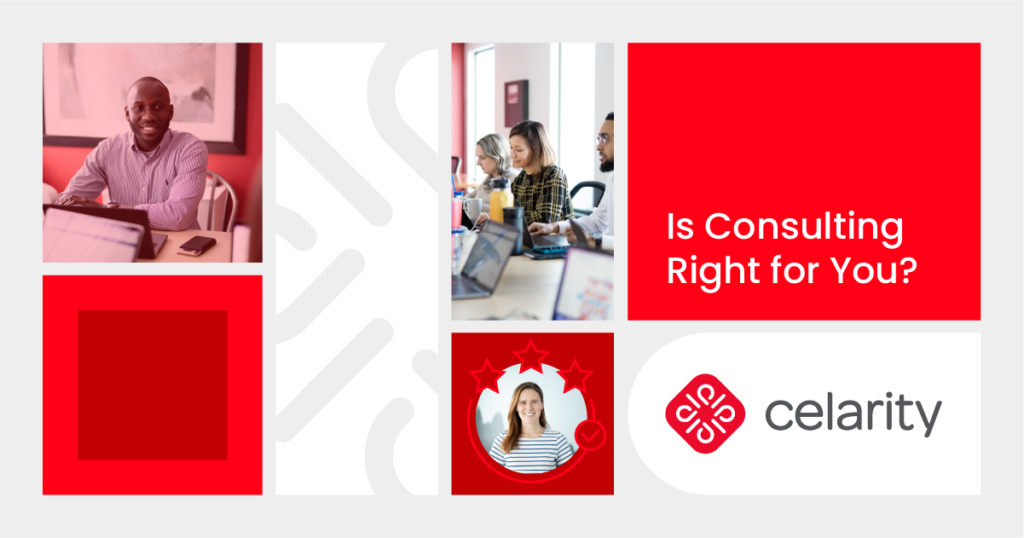As many people are considering new job opportunities, most will weigh how those opportunities fit into their lives, goals, and aspirations. Consultant work might not have been something you’ve considered in the past, but now, as you’re re-evaluating, it might be a good time to consider consulting and whether or not it’s the right path for you (brush up on what consulting is + its benefits here).
So where should you start evaluating how consulting differs from traditional employment — when navigating relationships, stability, career development, and more?
Recent consultants and contract employee survey data show there are many considerations for “non-traditional” employees. Based on these findings, here are a few of the self-identified elements that contribute to happy and successful work as a consultant team member.
Elements Necessary to Create a Happy Lifestyle as a Consultant
Relationships
Relationships matter. If you’re full-time or consulting in a role, you want to feel valued by peers and leadership. Consultants want to be a part of the team and have a sense of belonging. This sense of belonging includes; participating in meetings, voicing ideas, and fostering direct relationships with colleagues.
But, there is a second and equally meaningful relationship for consultant team members — rapport with the recruiter and staffing agency that you work on behalf of. Because as a consultant team member, you often technically work as an employee of the staffing agency. To feel connected, you need to feel comfortable going to the staffing agency with questions, concerns, or support in your consultant role.
An essential thing for consultant team members is to feel your team and staffing agency work together to help them achieve their career goals.
Stability
Stability is often the #1 reason people provide for not wanting to work in a consultative capacity. But it does not need to be. Consultant team members want to ensure stability in their work and income. Recruiters can help create stability by fulfilling consultant requirements, renewing client contracts before deadlines, or lining up new employee opportunities before a contract expires. It’s important for you to feel like you have a strong relationship with your recruiter so you can feel confident approaching them with your needs; from things that need to be addressed in your current role to options for ‘what’s next’ in your career to other options when a contract comes to an end.
Transparency
Transparency is part of a bigger picture: trust in the organization to act with integrity and congruence on behalf of its employees, including consultant employees. As a consultant team member, you want your staffing agency and the client to consider your professional interests, and you want to know and understand what is going on behind the scenes when it comes to contract renewals, timelines, and feedback on your work performance. Essentially, “non-traditional” team members want access to the same information “traditional” team members glean from their direct relationship with their leader and the company they work within.
Communication
It can be tricky to strike the appropriate communication balance between your staffing agency and the company you work within. Communication styles and desired cadences vary greatly based on several factors, including personalities. However, feedback from consultant team members overwhelmingly indicates a desire for more personalized communications compared to automated check-ins or templated phone calls.
As a consultant team member, you may appreciate your recruiter’s semi-annual and annual calls directly. These conversations may allow you to discuss new opportunities, potential raises, feedback on your work assignment, and time to continue building your connection with your recruiter.
Benefits
Benefits may be one reason you think consultant work might not be right for you. Not all staffing agencies offer benefits to their consultant team members, which can sometimes be a turn-off. If you’re like many other people in the workforce, you have become accustomed to benefits packages that include healthcare, dental, and 401k, along with some paid time off.
Some staffing agencies provide benefit packages, and some even provide a portion of traditional PTO. As a consultant team member, you might want to weigh how much it means to you to have more flexibility vs. the amount of PTO allotted by a staffing agency.
Learning & Development
If you have a continuous improvement mindset, it might be difficult to give up the opportunity to have career development or paid learning opportunities in a consulting role. We all know that training and certifications can open the door to new career paths, and there are several ways for individuals to fulfill their learning and development needs. Some staffing agencies provide team member training, and some do not. Other options include local organizations and the new LinkedIn learning tools.
There are many career options, and consulting is one of them. Our suggestion is, don’t judge a book by its cover — do your research and decide what might be the next best move in your career.
If you’re interested in learning more about consulting roles and want to find the right partner to discuss the possibilities further, Celarity would love to hear from you.


